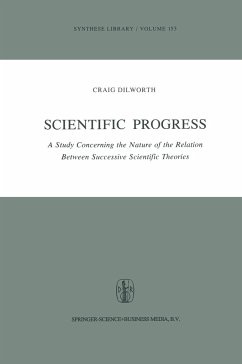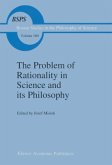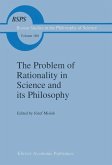For the philosopher interested in the idea of objective knowledge of the real world, the nature of science is of special importance, for science, and more particularly physics, is today considered to be paradigmatic in its affording of such knowledge. And no understand ing of science is complete until it includes an appreciation of the nature of the relation between successive scientific theories-that is, until it includes a conception of scientific progress. Now it might be suggested by some that there are a variety of ways in which science progresses, or that there are a number of different notions of scientific progress, not all of which concern the relation between successive scientific theories. For example, it may be thought that science progresses through the application of scientific method to areas where it has not previously been applied, or, through the development of individual theories. However, it is here suggested that the application of the methods of science to new areas does not concern forward progress so much as lateral expansion, and that the provision of a conception of how individual theories develop would lack the generality expected of an account concerning the progress of science itself.
Hinweis: Dieser Artikel kann nur an eine deutsche Lieferadresse ausgeliefert werden.
Hinweis: Dieser Artikel kann nur an eine deutsche Lieferadresse ausgeliefert werden.
About Scientific Progress:
'One of the most interesting contemporary approaches to questions related to the dynamics of science.' Revista de filosofia'
An insightful and original work.' Risto Hilpinen, University of Miami
'Free of unnecessary ballast, and written with didactical aptitude, this book gives a complete overview of how the different views of scientific progress have developed since the time of the Vienna Circle. It is a suitable introduction to a complex period in contemporary theory of knowledge. In later chapters the author presents his own standpoint, so that the work can also be used as a source of new impulses in this direction ... The author convincingly works out how from his point of view it is possible to explain the conflict between two theories as an incompatibility of perspectives, and at the same time avoid sliding into relativism by giving criteria for scientific progress ... I hope that my all too brief remarks will encourage the reader - and especially the interested non-specialist - to read this book.' Dialectica'Clear
'...interesting, and historiographically sensitive.' Isis
'The topic is an exceptionally difficult, but extremely important one. Most of Dilworth's discussion is clear, well-written and technically flawless. Complemented by the right materials it should serve as a useful text for graduate and advanced undergraduate study.' British Journal for the Philosophy of Science
'Dilworth's work is clear and suggestive. The basic theses are presented with elegant philosophical sobriety, and the work as a whole can be called scientific not only for its subject matter, but also for its method.' Investigacion y Ciencia
'This work must be considered as one of the most significant contributions to appear in the present debate concerning the problem of scientific change and scientific progress.' Evandro Agazzi, University of Fribourg
'The book will quickly recommend itself, and reward the reader.' Aslib
'[The book] gives valuable instruction designed to keep one abreast of developments in philosophical reasoning.' Methodology and Science
'This study differs from the stance commonly taken by epistemologists. The author has, for natural reasons, begun with the present state of the subject; he moves by degrees however to a position which is not only theoretically original, but which brings to a discussion that has become asphyxiated the oxygen necessary for it to regain its original epistemological content.' Epistemologia
'This book provides an extremely clear description and critique of the best known contemporary versions of philosophy of science, and a very suggestive ... solution of the general problem of scientific progress.' Annals of Science
'The views discussed are carefully referenced and traced back to original sources. In this respect the work is especially useful to anyone interested in general problems in the philosophy of science.' Choice
'One of the most interesting contemporary approaches to questions related to the dynamics of science.' Revista de filosofia'
An insightful and original work.' Risto Hilpinen, University of Miami
'Free of unnecessary ballast, and written with didactical aptitude, this book gives a complete overview of how the different views of scientific progress have developed since the time of the Vienna Circle. It is a suitable introduction to a complex period in contemporary theory of knowledge. In later chapters the author presents his own standpoint, so that the work can also be used as a source of new impulses in this direction ... The author convincingly works out how from his point of view it is possible to explain the conflict between two theories as an incompatibility of perspectives, and at the same time avoid sliding into relativism by giving criteria for scientific progress ... I hope that my all too brief remarks will encourage the reader - and especially the interested non-specialist - to read this book.' Dialectica'Clear
'...interesting, and historiographically sensitive.' Isis
'The topic is an exceptionally difficult, but extremely important one. Most of Dilworth's discussion is clear, well-written and technically flawless. Complemented by the right materials it should serve as a useful text for graduate and advanced undergraduate study.' British Journal for the Philosophy of Science
'Dilworth's work is clear and suggestive. The basic theses are presented with elegant philosophical sobriety, and the work as a whole can be called scientific not only for its subject matter, but also for its method.' Investigacion y Ciencia
'This work must be considered as one of the most significant contributions to appear in the present debate concerning the problem of scientific change and scientific progress.' Evandro Agazzi, University of Fribourg
'The book will quickly recommend itself, and reward the reader.' Aslib
'[The book] gives valuable instruction designed to keep one abreast of developments in philosophical reasoning.' Methodology and Science
'This study differs from the stance commonly taken by epistemologists. The author has, for natural reasons, begun with the present state of the subject; he moves by degrees however to a position which is not only theoretically original, but which brings to a discussion that has become asphyxiated the oxygen necessary for it to regain its original epistemological content.' Epistemologia
'This book provides an extremely clear description and critique of the best known contemporary versions of philosophy of science, and a very suggestive ... solution of the general problem of scientific progress.' Annals of Science
'The views discussed are carefully referenced and traced back to original sources. In this respect the work is especially useful to anyone interested in general problems in the philosophy of science.' Choice
From reviews of the previous editions:
"One of the most interesting contemporary approaches to questions related to the dynamics of science." (Revista de filosofia)
"An insightful and original work." (Risto Hilpinen, University of Miami)
"Free of unnecessary ballast, and written with didactical aptitude, this book gives a complete overview of how the different views of scientific progress have developed since the time of the Vienna Circle. It is a suitable introduction to a complex period in contemporary theory of knowledge. In later chapters the author presents his own standpoint, so that the work can also be used as a source of new impulses in this direction ... The author convincingly works out how from his point of view it is possible to explain the conflict between two theories as an incompatibility of perspectives, and at the same time avoid sliding into relativism by giving criteria for scientific progress ... I hope that my all too brief remarks will encourage the reader - and especially the interested non-specialist - to read this book." (Dialectica)
"Clear, interesting, and historiographically sensitive." (Isis)
"The topic is an exceptionally difficult, but extremely important one. Most of Dilworth's discussion is clear, well-written and technically flawless. Complemented by the right materials it should serve as a useful text for graduate and advanced undergraduate study." (British Journal for the Philosophy of Science)
"Dilworth's work is clear and suggestive. The basic theses are presented with elegant philosophical sobriety, and the work as a whole can be called scientific not only for its subject matter, but also for its method." (Investigacion y Ciencia)
"This work must be considered as one of the most significant contributions to appear in the present debate concerning the problem of scientific changeand scientific progress." (Evandro Agazzi, University of Fribourg)
"The book will quickly recommend itself, and reward the reader." (Aslib)
"[The book] gives valuable instruction designed to keep one abreast of developments in philosophical reasoning." (Methodology and Science)
"This study differs from the stance commonly taken by epistemologists. The author has, for natural reasons, begun with the present state of the subject; he moves by degrees however to a position which is not only theoretically original, but which brings to a discussion that has become asphyxiated the oxygen necessary for it to regain its original epistemological content." (Epistemologia)
"This book provides an extremely clear description and critique of the best known contemporary versions of philosophy of science, and a very suggestive ... solution of the general problem of scientific progress." (Annals of Science)
"The views discussed are carefully referenced and traced back to original sources. In this respect the work is especially useful to anyone interested in general problems in the philosophy of science." (Choice)
"One of the most interesting contemporary approaches to questions related to the dynamics of science." (Revista de filosofia)
"An insightful and original work." (Risto Hilpinen, University of Miami)
"Free of unnecessary ballast, and written with didactical aptitude, this book gives a complete overview of how the different views of scientific progress have developed since the time of the Vienna Circle. It is a suitable introduction to a complex period in contemporary theory of knowledge. In later chapters the author presents his own standpoint, so that the work can also be used as a source of new impulses in this direction ... The author convincingly works out how from his point of view it is possible to explain the conflict between two theories as an incompatibility of perspectives, and at the same time avoid sliding into relativism by giving criteria for scientific progress ... I hope that my all too brief remarks will encourage the reader - and especially the interested non-specialist - to read this book." (Dialectica)
"Clear, interesting, and historiographically sensitive." (Isis)
"The topic is an exceptionally difficult, but extremely important one. Most of Dilworth's discussion is clear, well-written and technically flawless. Complemented by the right materials it should serve as a useful text for graduate and advanced undergraduate study." (British Journal for the Philosophy of Science)
"Dilworth's work is clear and suggestive. The basic theses are presented with elegant philosophical sobriety, and the work as a whole can be called scientific not only for its subject matter, but also for its method." (Investigacion y Ciencia)
"This work must be considered as one of the most significant contributions to appear in the present debate concerning the problem of scientific changeand scientific progress." (Evandro Agazzi, University of Fribourg)
"The book will quickly recommend itself, and reward the reader." (Aslib)
"[The book] gives valuable instruction designed to keep one abreast of developments in philosophical reasoning." (Methodology and Science)
"This study differs from the stance commonly taken by epistemologists. The author has, for natural reasons, begun with the present state of the subject; he moves by degrees however to a position which is not only theoretically original, but which brings to a discussion that has become asphyxiated the oxygen necessary for it to regain its original epistemological content." (Epistemologia)
"This book provides an extremely clear description and critique of the best known contemporary versions of philosophy of science, and a very suggestive ... solution of the general problem of scientific progress." (Annals of Science)
"The views discussed are carefully referenced and traced back to original sources. In this respect the work is especially useful to anyone interested in general problems in the philosophy of science." (Choice)









